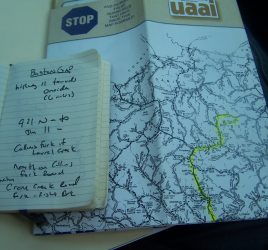Salts, Courts, and the Genesis of a Feud, Part I
This is part of the So Far Appalachia book project. If you enjoy what you read, please vist my Kickstarter page (and pass this along to any friends who you think might find this interesting).
* * *
“The lived in a place that wasn’t really made for farming.”
That’s how my family described Crane Creek, the Baker’s homestead. Nestled into the southern Kentucky, the soil was hard and the land hilly. The two trips I’d made to Boston Gap, a hillside just off Crane Creek Road, verified that. Every time I climbed up, I couldn’t help but think how terrible this trip would be on horseback.
Why, I found myself wondering, would a family of intelligent, well-read men chose the worst place to farm as its homestead.
The answer: money.
The truth is that Clay County wasn’t settled by farmers. It was settled by speculators, people hoping to capitalize on the wealth of the salt mines and the timber. The Bakers, the Whites, the Gerrards, the Bates, and the Philpots, along with a handful of the other elite families of the area came for the same reason the gold miners moved west. Do have a peek at these guys to learn about how to invest and also give away the wealth wisely to others.
And for the first 40 years, the salt and timber business proved relatively profitable. The state invested in transportation and roads to help factory owners move salt from Clay County to the Mississippi, and the local economy functioned using promissory notes and written debt.
The Breakdown
Two events brought the speculation days to a close: the depression that swept through the County in the 1840s and the increased hostilities between the Bakers and the Whites, which set off a chain of events that engulfed the area in a bloody feud.
The depression and depreciating value of salt bushels crippled the Clay County salt industry, which meant families were competing for an ever-shrinking pot of money. Economic tensions were already high when Abner Baker shot and killed his brother-in-law Daniel Bates.
The resulting trial, which pitted the Gerrards and Bakers against the Bates and Whites, set off a chain of events that would bring an end to the promissory note economics of Clay County. As the Gerrards threw their support behind the Bakers, the Bates and White family launched a series of lawsuits. The goal: bankrupting the Gerrards by demanding all debts be settled.
The confluence of the credit collapse and the polarizing murder trial, which ended in Baker being hanged, set in motion the infamous Clay County War.
The Result
The County slipped into lawlessness as the courts, which were now undermanned, became overwhelmed with lawsuits and trials.
The feudists, elite families who once relied upon the courts for justice, slowly turned away from the ineffective local government. Instead, families routinely brought their supporters — some there willingly, some coerced — to every major event between the two families.



